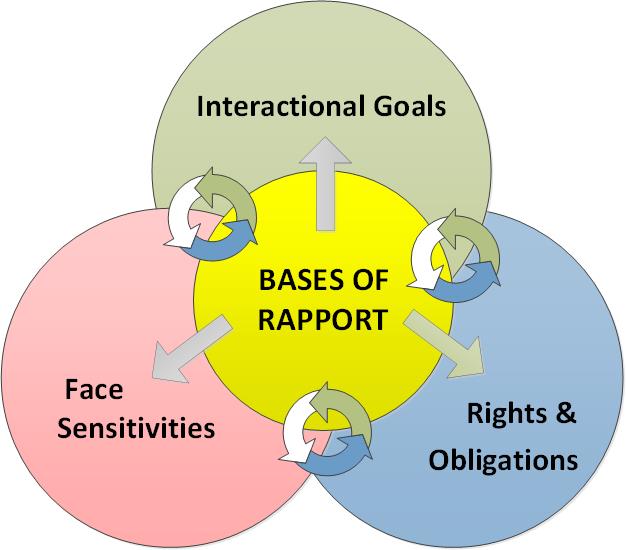
In many ways, rapport is a slippery term and it’s not always easy to translate into another language. Yet it’s also an important concept, widely referred to in sectors such as healthcare, customer service, and public security. In fact, we all need to build rapport with those around us. So, what is rapport and how can it be managed?
What is rapport?
Here are two useful definitions of rapport:
“People’s subjective perceptions of (dis)harmony, smoothness–turbulence and warmth–antagonism in interpersonal relations.”
Spencer-Oatey, H. & Franklin, P. (2009) Intercultural Interaction. Palgrave, p.102.
“The invisible wave along which information can flow from the one to the other. If there is a problem with rapport the information received may be distorted or not received at all.”
St-Yves, M, (2006) The psychology of rapport. Five basic rules. In T. Williamson (Ed.) Investigative Interviewing: Rights, research, regulation. Willan Publishing, p.88.
These definitions point to three crucial elements that are important to remember.
- Rapport is a subjective perception – so watch out for different reactions!
- It has an affective (i.e. emotional) aspect to it – so it can have a major impact!
- It affects communication – so its management is vital!
Rapport is affected by three key elements.

Interactional Goals
Consider the following situation:
You have a health problem and you book an appointment to see your doctor. The doctor is running late with her appointments, and when you are called in, she is obviously trying to catch up on time. She asks you a few very cursory questions and then says, ‘come back in two weeks if you aren’t feeling any better’.
How would you feel? The chances are that you would feel a range of negative emotions, such as annoyed, disappointed, frustrated. This is because your goal of getting medical help was not fulfilled and rapport between you and your doctor will likely have been damaged.
So, interactional goal is a key element affecting rapport. People often (although not always) have specific goals when they interact with others and these can be transactional (i.e. task-focused), relational or a mixture of the two. These ‘wants’ can significantly affect people’s perceptions of rapport, with any failure to achieve them causing frustration and annoyance.
Rights and obligations
Your annoyance with your doctor will probably not only be based on your thwarted goal of receiving good medical help. It is also likely to relate to your sense of what doctors ‘should do’ in their role as a doctor. Patients have the right to expect quality medical care from their doctor, and doctors have the obligation to provide such quality medical care. Failure to fulfil these rights and obligations will undermine rapport; outstanding service will enhance it.
So, the second key element that affects rapport is our perception of what others should or should not do when carrying out their role (i.e. our sense of entitlement), and whether our expectations are met or not. If they are not met, rapport is likely to be damaged.
Face sensitivities
Now let’s consider a related scenario.
As you are sitting in the waiting room, waiting to see the doctor, another person strikes up a conversation with you. After a few moments, he asks you what is wrong with you and why you want to see the doctor. You feel embarrassed by his question because your medical issue is a sensitive one and you don’t want to talk about it to a stranger, especially not in a public place like a waiting room.
The embarrassment you’re likely to feel in this situation is a reflection of your ‘face sensitivity’. In other words, we each are sensitive to comments from others that make us feel uncomfortable, such as when they criticise us, become too personal, or treat us as incompetent. This too undermines our sense of rapport with the other person.
In summary: rapport is affected by three key elements:
- our interactional goals
- our sense of rights and obligations
- our face sensitivities
Whenever any of these elements is thwarted or undermined, rapport is negatively affected. So, to manage rapport, we need to pay close attention to each of these elements, doing our best to fulfil each of them in line with the other person’s preferences. This is made more complex by the impact of culture.
Rapport and the impact of culture
When we are working in contexts of cultural diversity, we may inadvertently undermine rapport in ways such as the following:
- Be unaware of the other person’s interactional goals; e.g. we may assume we know what their goals are and overlook talking with them about their goals and ours
- Hold different conceptions of role obligations, and hence fail to fulfil the other person’s expectations
- Fail to realise what words or behaviour will be embarrassing for the other person.
There are many more aspects to this crucial topic. So, to learn more about rapport and Helen’s world-renowned work on rapport management, including across cultures, get in touch with us.
Professor Helen Spencer-Oatey, Director

